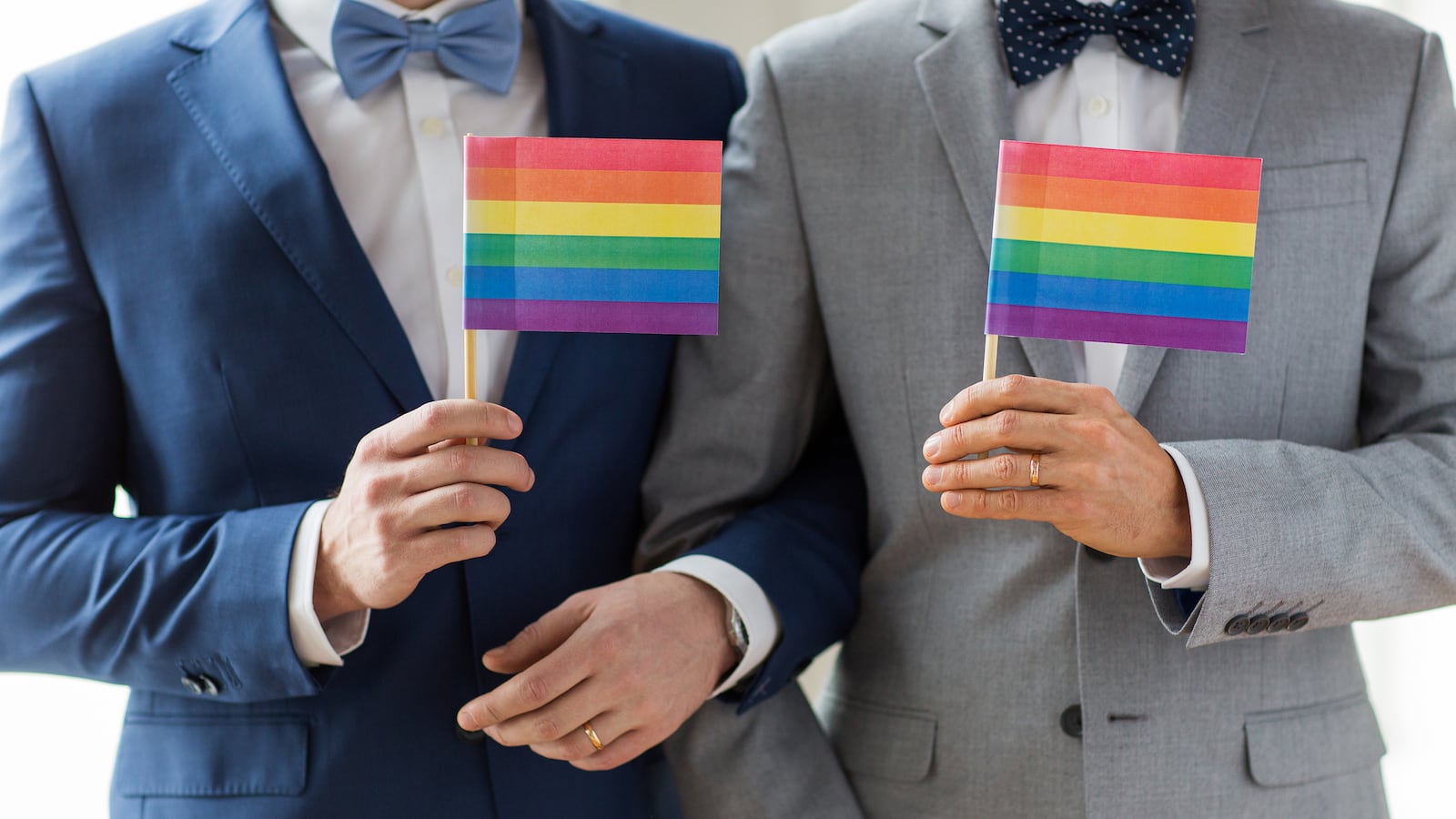Next month, my husband and I will celebrate both of our anniversaries. When we decided to marry each other the second time, we chose the same month we had picked for our first go round.
With its decision to nullify bans on same-sex marriage nationwide, the Supreme Court has swept into obsolescence a quirk of gay and lesbian life, at least of the past generation or two.
Lesbians and gays no longer have any reason to marry each other more than once without the tedium of breaking up in the interim.
But as the tide of acceptance has turned over the past couple of decades and brought with it varying degrees of legal recognition, many of us in same-sex couples have found ourselves exchanging vows with each other multiple times for domestic partnerships, civil unions, marriage itself, or for the simple sake of celebrating our love for each other.
Not anymore.
I knew relatively soon after I met my husband that I wanted to spend the rest of my life with him.
One advantage of suffering through the cavalcade of preposterous disasters I had called relationships up until then is that I recognized quality when I saw it. I knew I was done looking when I found him.
We chose to solemnize our commitment to each other with vows and rings and cake, just like any other couple.
But we did so knowing that those vows carried no weight beyond that which we assigned to them.
Though same-sex marriage was legal in nearby Massachusetts by that time, we saw no advantage to obtaining rights in a state where we wouldn’t be living and that would not transfer to ours.
So we stood in front of a mass of friends and family, made our promises to each other, and went about setting up a home.
That was 10 years ago.
Brenda Adler and Melody Main have been together for twice as long. The first time they got married, it was for reasons similar to ours.
“We just wanted to be ‘married’ and share our love with our families and friends,” Adler told me in an email. “We had a ceremony in Westbrook, Maine at the Unitarian Church.
After the wedding, we had a reception at Sisters, a lesbian bar in Portland, with friends and family in attendance. We probably had about 100 people there.”
Main and Adler gained no legal status from that first ceremony, either. The minister in their celebration wasn’t even allowed to perform such services in her home church at the time.
It was in 2000 that civil unions were first introduced into our national lexicon. The state of Vermont created this marriage-lite option after its Supreme Court mandated some kind of near-equivalent to marriage for gays and lesbians.
Four years prior, the Defense of Marriage Act had been signed into law by Bill Clinton (it’s lovely that you’ve come around, Bill), which permitted recalcitrant states to deny recognition of same-sex marriages that other states might have legalized, and further allowed the federal government to deny recognition of such marriages also.
Vermont’s was the first significant step toward legally legitimizing relationships that a few years before had been handily delegitimized by veto-proof majorities in both houses of Congress.
It was Vermont’s law that led Adler and Main to marry each other for the second time.
“When Vermont legalized civil unions,” Adler continued, “we thought we should ‘do something legal’ to reap whatever benefits we could, since having a legal marriage seemed like a dream. We drove to Burlington and had a private, civil ceremony with a justice of the peace on the shores of Lake Champlain.”
One couple. Two ceremonies (thus far). No divorces.
In 2003, the Supreme Court in Massachusetts ruled that nothing short of marriage itself was acceptable for same-sex couples.
When that decision took effect the next year, it became the first state with full marriage equality. With that, a slow turn in the tide began to happen.
It was years later that my husband and I were sitting on our couch watching election returns come in when we saw that a referendum in our own state had legalized same-sex marriage.
It is among the most joyous moments of my life. (Friday would be another.) I turned to him and asked if he wanted to get married again, this time with rights. After he agreed, I updated my Facebook relationship status to “engaged.”
It was achieving legal recognition that made the difference for Lindsay (who asked that I use only her first name) and her wife, too. For them, such recognition was available by the time of their first ceremony.
The two of them have been together for three years, and knew early in their relationship that they wanted to have a family. They ended up contracting with a sperm donor, and it was on the advice of legal counsel that they sought civilly-recognized status to protect their parental rights in the state where they live.
“[Our lawyer] advised us strongly to consider a Colorado civil union, which were available starting in summer of 2013,” Lindsay wrote to me, “to help shore up my wife’s parental rights (since I would be the one carrying the baby). We probably would have gotten around to it eventually anyway, but neither of us was especially interested in a legal ceremony, so the parental rights were a big part of our decision to get a civil union in fall 2013.”
While happy to have civil protections for their growing family, Lindsay found the not-quite-marriage status of their relationship “a little unsatisfying,” though still reason enough for a party and anniversary that they continue to mark. But it was their legal marriage that ended up feeling more special.
“Sometime in 2013 same-sex marriage became recognized in New Mexico, which was exciting to us because prior to that it would have been a long road trip to get to somewhere where we could be married,” she continued. “By then I was pregnant, but we went ahead and took the relatively short drive to Santa Fe, which is one of my wife’s favorite places to visit, and got married at the courthouse.”
During this trip they met many other same-sex couples in pursuit of the same recognition they were seeking, and it was this element of their marriage that stood out most for her.
“The New Mexico courthouse wedding felt more special to me just because we were in a group of several (mostly same-sex) couples all there to get married,” she wrote. “In some ways this is the best audience to have for an exchange of vows, because everyone is in the same boat and very excited.”
Lindsay and her wife are now expecting their second child. Though same-sex marriage was legalized in Colorado last year, they do not have plans to have another ceremony there.
Main and Adler, on the other hand, had a third celebration when marriage equality came to Maine.
“Our wedding last June was by far the most incredible and validating event for us,” Adler concluded. “Many more family members and friends from away made the trip this time around and the love and support that was in the church that day was palpable, even to the casual onlooker. We had an awesome reception with 200 guests and just felt ‘complete’ that day. After 20+ years together, we were finally legally married!”
Like these other couples, I felt an unmistakable difference when my husband and I had our legal marriage. I’d been dry-eyed for most of our first ceremony, and I could barely make it down the aisle without crying the second time.
While I would never deny the meaning and beauty of saying vows to each other in front of our loved ones years before, when we exchanged them again (this time with two of our kids in the first pew), knowing we were sharing in a status that belonged to everyone was profoundly moving. It meant the world.
Dennis and Eddie (who also requested that only their first names be used) may find themselves taking the same step soon. Together for nearly 15 years, they traveled over 1,000 miles from their home in Missouri to have a civil union in Vermont in 2003. They’ve had no reason for another ceremony until now.
Dennis told me about the hassles they had to deal with on their trip, beyond the distance itself. Not one but two different government offices were closed when they went to get their paperwork.
“Despite all the obstacles, we arrived at the church a few minutes early,” he went on. “The pastor wanted to counsel us prior to the ceremony and was convinced of our love and dedication to each other. Although we knew the document would have no legal standing in Missouri, what mattered is what it meant for us, a special document demonstrating our commitment to each other.”
Even with this document, however, they find their relationship is still not accorded the same respect as those of opposite-sex couples.
“What we have learned over the last 15 years is that regardless of what it is called and the status of the document, too many still won’t regard our relationship as seriously as they do straight couples,” he continued. “Even those knowing we are together still say we are ‘friends’ rather than a couple.”
With the Supreme Court’s decision, they may now make plans for a second ceremony.
“We have discussed [marriage] a long time in hopes that someday the state of Missouri would allow same-sex marriage,” he concluded. “We would certainly like to be able to marry.”
And now they can.
Daniel Persing and Lance Marriott have had only one wedding. It just came with a long wait.
Marriott and Persing are newlyweds, after 14 years together. They got married on June 20. They knew there was only one place where they wanted their marriage to occur. It had to be Kansas City.
“We’re currently living in Texas, and we had been waiting and waiting,” Persing told me. “I proposed to him four years ago and we agreed that we would hold off until it was passed in Missouri. Granted, it was only two counties, but for us that was good enough.” [The only exceptions to Missouri’s now-nullified statewide ban on same-sex marriage were in St. Louis and Jackson counties.]
“To have the wedding in Kansas City made it even better,” he went on. “It’s where we met. It’s a city we love. It’s part of our history.”
When they turned in their signed license after getting married, Persing told me he cried when the clerk said, “Congratulations.” A moment they had waited for so long had arrived.
As homosexuality has become more and more a part of mainstream life, conversations have begun about what’s been gained and what’s been lost as part of this change. With Friday’s decision, gay and lesbian couples can tell stories about their marriages that are really no different from those of straight couples. This is, of course, as it should be. I am loath to sentimentalize a state of affairs with injustice as a necessary precondition.
But it remains that a particular facet of gay and lesbian life is passing out of relevance. Unique to a generation or two of same-sex couples and borne of a particular set of circumstances, the phenomenon of saying “I do” to the same spouse more than once as the legal landscape shifted around us is no longer going to have any connection to the reality of gay relationships going forward. Why would any couple, straight or gay, need to make promises to each other more than just one time?
Their stories and those like mine are going to be different. I’m overjoyed about that for them. But I got to marry the guy I love twice, and I’m glad about that, too.






